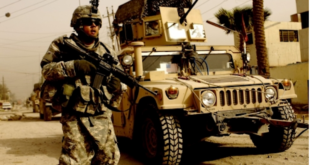BEIRUT (AFP) — Lebanon’s powerful pro-Syrian Parliament Speaker Nabih Berri was engaged on Tuesday in talks with anti-Damascus forces in a bid to save the fragile coalition government after a boycott by Shiite ministers.
Prime Minister Fuad Siniora’s government has been battling for its survival since last week’s boycott by five ministers from the pro-Syrian Amal-Hizbollah coalition in protest at calls for an international probe into a wave of attacks against Damascus critics.
Political tensions have been running high since charismatic lawmaker and newspaper magnate Gibran Tueni, a virulent critic of Syria’s role in Lebanon, was killed in a bomb blast on December 12, the latest in a wave of similar attacks targeting Damascus critics.
Berri, leader of Amal, was holding talks with a number of politicians and sent on Tuesday a three-member team from the party to meet with Cardinal Nasrallah Butros Sfeir, mentor of anti-Damascus Christians.
The Amal delegation also met anti-Syrian former president Amin Gemayel, a senior member of the Christian Kataeb Party.
After the meeting with Sfeir, Amal official MP Ali Hassan Khalil told reporters that “the door is not yet closed… and all the alternatives are open until Thursday,” the day of the weekly Cabinet session.
“We are also engaged in dialogue with the prime minister,” once a close aide to ex-premier Rafiq Hariri whose assassination in February triggered massive protests that led to the end of Syria’s 29-year military presence.
But Hizbollah has remained more cautious, and spokesman Mohamad Afif told AFP on Tuesday that “our position remains the same, namely that we will not participate in the government until the reasons of the boycott have been resolved.”
Sfeir also held separate meetings on Tuesday with representatives of the anti-Syrian parliamentary majority and their former allies in the Free National Current led by popular Christian leader General Michel Aoun.
In a bid to crank up the pressure, pro-Syrian President Emile Lahoud warned that he would not attend the weekly Cabinet meeting on Thursday if divisions continued.
“If the Shiite ministers do not attend, the president will not preside over the weekly Cabinet session on Thursday,” a source close to Lahoud told AFP. “A principal party to the government cannot be absent from the government.
Damascus continues to deny involvement in Hariri’s killing but an international probe has implicated Syrian officials and led to the arrest of top aides to Lahoud.
Anti-Syrian forces renewed calls Monday for Lahoud’s resignation and appealed for dialogue in order to reach a political consensus necessary to confront what they termed Syria’s “terrorist and aggressive role” in Lebanon.
Berri said dialogue will be based on three main points: finding the truth about Hariri’s killing, relations with Syria and UN Security Council Resolution 1559 which angered many by calling for disarming all militias in Lebanon.
Anti-Syrian forces which led an “independence uprising” to end Syria’s dominant role in Lebanese political and military affairs won parliamentary majority at elections in May and June.
But although they succeeded in forming a coalition government including Amal-Hizbollah groups, they suffered the loss of Aoun’s movement.
Aoun said on Monday he was “ready to meet any call for dialogue,” but warned that “if the government and parliament do not declare dialogue within a week, we will call for the resignation of the government and we will be the strongest of foes to this government.”
Syria says will cooperate with new Hariri probe
CAIRO (Reuters) — Syria’s foreign minister said on Tuesday that witnesses misled an investigation into the killing of former Lebanese Prime Minister Rafiq Hariri but that Damascus would cooperate with the new head of the inquiry.
Belgian prosecutor Serge Brammertz is expected to take over as head of the UN inquiry from German Detlev Mehlis, who directly blamed the “Syrian authorities” for Hariri’s murder in remarks published on Saturday.
Many Lebanese have long blamed Syria for the killing, but Damascus has denied the charges.
“We in Syria have decided that we will deal sincerely and constructively with the new head of the international committee and we will give him all possible assistance to reach the truth,” Foreign Minister Farouq Sharaa told reporters.
“We don’t want to tell him that such and such happened in the previous investigation — that there were false witnesses whose intentions appeared afterwards and there were biased witnesses with narrow interests in Lebanon who gave statements that do not serve the investigation and the truth,” Sharaa said.
“He [the new head] will discover these issues before he arrives in Damascus. But we will welcome him in Damascus,” he said after a meeting between Egyptian President Hosni Mubarak and Syrian leader Bashar Assad in Cairo.
UN officials and diplomats said on Monday that the appointment of Brammertz, the deputy prosecutor of the International Criminal Court, could be announced on Tuesday or Wednesday.
Mehlis made clear in his reports to the Security Council that senior Syrian intelligence officials and their Lebanese allies were behind the killing of Hariri and 22 others in Beirut on February 14. He also accused Damascus of slow cooperation.
 Eurasia Press & News
Eurasia Press & News



